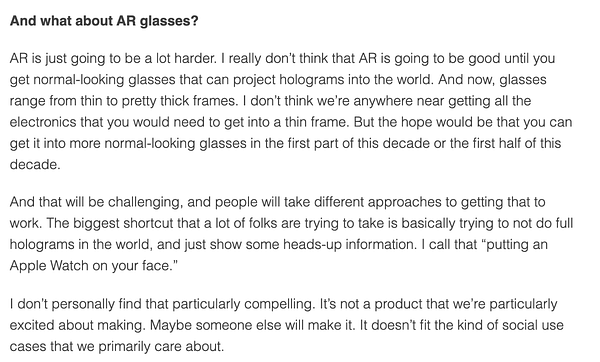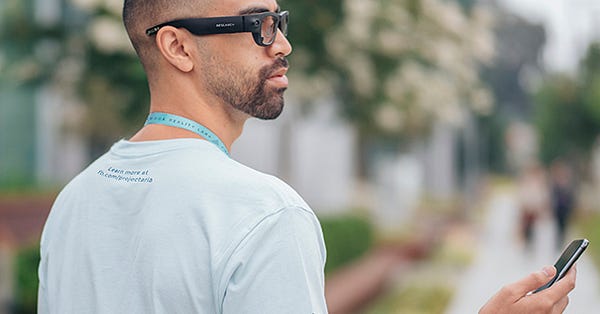Facebook is desperate to get a piece of the next-generation consumer hardware
And Zuck's paranoia of being dependent on Apple and Google is right up there.
👋 Welcome to the FWIW by David Tvrdon, your weekly tech, media & audio digest.
🌐 Online version. 👉 Be sure to subscribe, if you were sent this newsletter.
P.S.: A lot of news this week so there is again a shorter main topic.
P.S.2. 🧑🎓 Back in May Coursera announced ‘Guided Projects’ saying you can gain job-relevant skills with short (up to 2 hours), hands-on learning experiences. If you enroll by 30th September, Coursera made a bunch of them for free (e.g. Build a Full Website using WordPress; Build an E-commerce Dashboard with Figma; and others)
P.S.3. For Apple users: iOS 14 is available to update your iPhone, as are the new watchOS and iPadOS.
In this edition
👓 Zuck & co. really want to set the trends for AR/VR. Will you trust them?
📦 A lot of new hardware news: Apple Watch Series 6, iPads, PS5, GoPro Hero 9…
💬 Other tech, media, podcasting & gaming news

Facebook really wants us to trust it with AR/VR revolution

📸 by Project Aria
It’s not a secret that Mark Zuckerberg is afraid that Facebook will miss the next generation of consumer hardware shift. After personal computers came smartphones and have ruled the market ever since.
Facebook was unsuccessful in carving a market with its own device and its own operating system. It has had to rely on Apple and Google as intermediaries to ship the next updates to its apps.
And that is not a place where you want to be when you have the ambitions of Facebook and not well kept dirty secrets like Cambridge Analytica.


How far is an AR world?
Mark Zuckerberg is the first to admit that the form factor still has a lot that you want to work on. As you read that interview it is obvious Zuck is more excited about VR than AR:
A lot of people think that AR is the thing that matters, and VR is this niche, smaller thing. My outlook on that has shifted. I actually think VR is going to be quite important for people, too. And over the next few years, I think it’s going to just grow significantly faster.
Nonetheless, there is a timeline: 2024.
Yep, that sounds like a real hardware product cycle. Basically, before you ship generation one, you already had the previous two generations in your drawer. That was the case with Surface Duo and also with the first iPhone. If you are Samsung, you sometimes ship it to the market a generation sooner than it would have been better.
But, as The Information notes, Facebook plans the consumer release of “smart glasses” next year with the capability of recording video, similar to Snap’s Spectacles. The glasses will be a version of Ray Bans designed by Ray Bans maker Luxottica under a deal between the two companies.
Side-note: Ben Thompson wrote a widely read post on why he thought VR would be smaller than AR in 2018:
Again, though, Facebook aside, virtual reality is more compelling than you might think. There are some experiences that really are better in the fully immersive environment provided by virtual reality, and just because the future is closer to game consoles (at best) than to smartphones is nothing to apologize for. What remains more compelling, though, is augmented reality: the promise is that, like smartphones, it is an accompaniment to your day, not the center, which means its potential usefulness is far greater. To that end, you can be sure that any Facebook executive would be happy to explain why virtual reality and Oculus is a step in that direction.
Who is going to trust Facebook?
Now the big question remains. Will people trust a personal product from Facebook? The last hardware product from the company - Portal, hasn’t been a hit and until today we do not know how many of the home smart screen devices were sold.
Facebook during the 2-hours Connect event also introduced the Responsible Innovation Principles:
PRINCIPLE #1 Never surprise people
PRINCIPLE #2 Provide controls that matter
PRINCIPLE #3 Consider everyone
PRINCIPLE #4 Put people first
Now, it’s good to see Facebook realizes that trust runs low with its brand and products and is doing everything to build that up from the ground up for the next generation of their products.
Though in my mind I still cannot shake the feeling to have personal hardware made by Facebook anywhere near me and not at all on my face. And I am not the only one.


RELATED: The Verge has all the announcements that came out of the seventh annual Facebook Connect.
ALSO RELATED: The New York Times and Facebook have struck a multi-year partnership to co-develop augmented reality (AR) filters and effects on Instagram that help users access and contextualize New York Times journalism. The Times has built a dedicated "AR Lab" team within its research and development unit of more than a dozen employees. [Axios]
And a chat with Mark Zuckerberg by tech YouTuber MKBHD on virtual reality, holograms, and the future of devices (you can really feel how much Zuck is excited for VR):

🙏 Liked it so far? ❤️ Support this newsletter by sharing it, thanks!

In other news
TECH
⌚ New Apple Watches (and iPads). First, let me tell you the biggest news were the new services announces as if a side-note and not the new generations of the devices. Apple One was finally introduced to the underwhelming response from the media. The problem with bundles is you get something you don’t want for more money than you might pay for single services. Until the bundle is compelling enough (meaning there are hundreds or thousands of shows on TV+ and maybe popular games on Arcade) this won’t be a hit for consumers. But who knows. [Wired]
Fitness+ was maybe the service I was anticipating the most. Unfortunately, it is now launching globally and is way too expensive for my taste ($9,99), there are cheaper competing services already out there.
Apple Watch Series 6. Has an oximeter and altimeter. Also a brighter display.
Apple Watch SE. A cheaper new watch without an oximeter and ECG.
New iPad (8th generation) & new iPad Air (4th generation)
New iPhones? Nope. Possibly in October.

👾 Nvidia buys Arm from SoftBank for $40 Billion. The deal has an interesting backstory but much more important is what does this mean for the chip market. Arm has been a kind of Switzerland dealing with many costumers from Apple to Samsung. What does it all mean? First, the acquisition is likely to face regulatory scrutiny. Second, Nvidia becomes a really big player and will have a mobile chip business important for the future. [New York Times]
🕺 The White Housse is reportedly not happy with TikTok & Oracle “tech partnership” deal. By not it’s hard to understand the situation clearly. The Trump officials are assessing the deal and meanwhile saying they would be happier with a US owner having an above 50% ownership stake. But that is not something ByteDance would be happy with and possible nor would China. [Wall Street Journal]
💻 IBM releases a roadmap for scaling quantum technology. IBM thinks it can deliver a quantum computer that would marry enormous computing power with a tough-to-achieve low rate of errors by 2023. [Axios]
📲 Google Pixel 5 is coming on September 30th. There will be also a new Chromecast announced and a smart speaker. [The Verge]
👀 Facebook announced Oculus Quest 2. Starting at $299, with a lighter design, 50% better resolution, 90Hz refresh rate, up to 256GB storage, the device is coming October 13th. [Engadget]
🤜 GoPro Hero 9 review: 5K for under $500. [The Verge]
MEDIA
📕 Membership Guide was launched. Membership Puzzle Project in partnership with The Lenfest Institute and the Google News Initiative — released the Membership Guide. It is the culmination of three years of study and support for membership models in news. [MPP]
New York Magazine has NYT’s Ben Smith profile. [Intelligencer]
How The Economist has tripled the number of subscribers driven by LinkedIn. [Digiday]
'From start to success' — New handbook to support startups striving for media viability. [DW]
Gen Z vs. misinformation. Gen Z may be more immune to the lure of misinformation because younger people apply more context, nuance, and skepticism to their online information consumption, experts and new polling suggests. [Axios]
How The Atlantic gained 300,000 new subscribers in the past 12 months. [Digiday]
PODCASTS & AUDIO
🎧 Podcasts are now also on Amazon Music. So far just the USA and UK, but soon to be expected elsewhere the service is available. The company said it has a catalog of 70 thousand titles with originals exclusives. Maybe this is another opportunity to talk about “exclusive podcast only available on service X”. Are they podcasts anymore? Isn’t the whole point of podcasts to be available everywhere? Let me know, what do you think. This also applies to Spotify, Apple, and others. [Wall Street Journal]
🔘 Music Licensing 101: What Podcasters Need to Know. [Podcast Movement]
🔊 IAB Podcast Upfront highlights. The annual conference has gone virtual. Check out the Twitter thread for the highlights. For example, during the conference, The Daily announced it has 4 million daily listeners.

GAMING
🎮 Sony shocked, PS5 will start at $399. [The Verge]
Sony has announced that the PlayStation 5 will cost $499.99 when it launches on November 12th, alongside the $399.99 Digital Edition. Preorders will begin on September 17th at “select retailers.”
The pricing puts Sony squarely up against Microsoft’s next-gen consoles, with the company set to release its entry-level Xbox Series S at $299 and its flagship Xbox Series X for $499 on November 10th.

😮💨 Apple changed App Store rules just to annoy Microsoft. Microsoft, Google, and Facebook can operate their cloud gaming services on iOS but they have to submit every game for review which is a way of making them not to do it. Oh, Apple. [The Verge]
Catch me on Twitter or LinkedIn. Was this forwarded to you? 👉 Subscribe over here.



